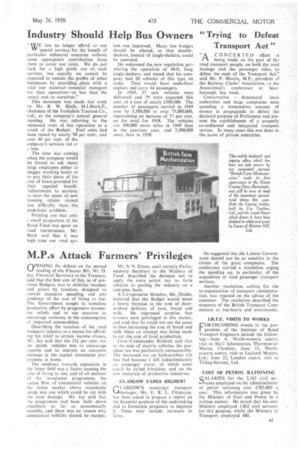M.P.s Attack Farmers' Privileges
Page 37

If you've noticed an error in this article please click here to report it so we can fix it.
OPENING the debate on the second reading of the Finance Bill, Mr. D. Jay, Financial Secretary to the Treasury, said that the first aim of this, as of previous Budgets, was to stabilize incomes and prices by taxation, designed to restrict excessive spending and any tendency of the cost of living to rise. The Government sought to stimulate productive effort by progressive incometax reliefs and to use taxation to encourage economy in the consumption of imported commodities.
Describing the taxation of the road transport industry as a means for affording tax relief to certain income classes, Mr: Jay said that the 33i• per cent, tax on goods vehicles was to encourage exports and to restrain an excessive increase in the capital investment programme at home.
The tendency towards expansion in the latter field was a factor causing the cost of living to rise, and of all sections of the investment programme, the excess flOw of commercial vehicles on the home market above reasonable needs was one which could be cut with the least damage. Mr. Jay said that the programme • had been heId down elsewhere so far as economically possible, and there was no reason why commercial vet-licks shbtild be exempt. Mr. S. N. Evans, until recently Parliamentary Secretary to the Ministry of Food, described the decision not to apply the extra petrol tax to farm vehicles as putting the industry on a cost-plus basis.
A Co-operative Member, Mr. Dodds, declared that the Budget would mean a heavy increase in the cost of doorto-door delivery of coal, bread and milk, He expressed surprise that farmers were privileged in this matter, and said that he could not see the sense in thus intreasing the cost of bread and milk when an attempt was being made to cut the cost of food production.
Lieut.-Commander Baldock said that in the case of electric vehicles, the purchase tax was particularly unreasonable. The increased tax on hydrocarbon oils was had because it fell indiscriminately on passenger travel, of which some eou:d be called frivolous, and on the raw materials of productive indtistries.
GLASGOW FARES HIGHER?
GLASGOW'S municipal transport manager, Mr. E R. L. Fitzpayne, has been asked to prepare a report on the financial position of the undertaking and to formulate proposals to improve it. These may include increases in fares.




























































































